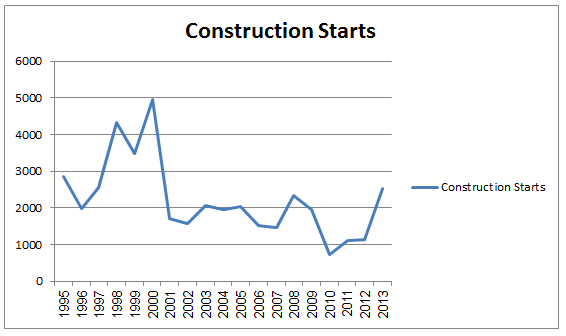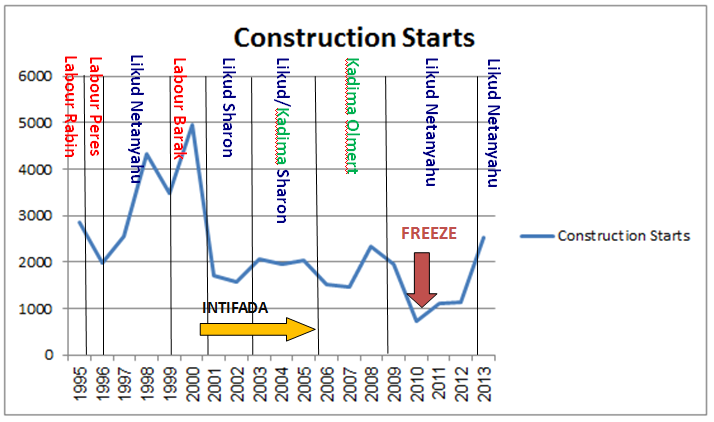Visitors to the BBC News website’s Middle East page on the morning of March 4th found there two very similar articles which include some of the same wording and material.
The earlier of those articles is dated March 3rd and is titled “Obama warns Israel’s Netanyahu over peace talks failure“. It relies heavily upon cherry-picked portions from an interview given by Obama to Jeffrey Goldberg the previous week and published the day before the Israeli prime minister’s arrival in the United States, together with interjected commentary from the BBC. 
The second article, from March 4th, is titled “Obama: Netanyahu must make ‘tough decisions‘” and its subject matter is the meeting between Obama and Netanyahu after the latter’s arrival in the US. That article too includes selected portions from the Goldberg interview with Obama of the previous week. It also includes the following lines:
“The meeting between the two leaders came soon after Israel released statistics showing a large increase in the pace of new settlement construction in the West Bank in 2013 over the year before.
About 500,000 Jews live in more than 100 settlements built since Israel’s 1967 occupation of the West Bank and East Jerusalem.
Settlements are considered illegal under international law, although Israel disputes this.
The Palestinians suspended the last round of talks in 2010 after a 10-month halt on Israeli building in the West Bank expired.”
Let’s take that last sentence first: the average reader would of course conclude from its wording that “the last round of talks” was taking place during that “10-month halt on Israeli building, but that is not exactly the case. The BBC neglects to inform readers that the Palestinians refused to engage in negotiations throughout 90% of the ten-month long ‘goodwill gesture’ construction freeze declared at the end of November 2009 and that during that time they also (unsuccessfully)  lobbied the OECD not to accept Israel as a member. Only at the beginning of September 2010 did the Palestinians agree to commence direct negotiations and as the construction freeze’s pre-designated time frame drew to a close on September 26th, Abbas demanded its extension and threatened to end the talks if he did not get his way, with the result that on October 2nd 2010 the negotiations ended.
lobbied the OECD not to accept Israel as a member. Only at the beginning of September 2010 did the Palestinians agree to commence direct negotiations and as the construction freeze’s pre-designated time frame drew to a close on September 26th, Abbas demanded its extension and threatened to end the talks if he did not get his way, with the result that on October 2nd 2010 the negotiations ended.
As we see, the BBC yet again compromises its own editorial guidelines by inserting its standard “settlements are considered illegal” formula without any clarification of the fact that numerous other contrary legal opinions also exist.
And what of the BBC’s claim of “a large increase in the pace of new settlement construction in the West Bank in 2013 over the year before”? That claim is based on data recently published by the Central Bureau of Statistics according to which throughout the whole of 2013, construction began – i.e. foundations were dug – on 2,534 housing units throughout Judea and Samaria (with the majority being private construction), compared to 1,133 units the year before. As for the number of dwellings actually completed, the BBC does not relate to those statistics, which show that there were 1,365 completes in 2013 compared to 1,271 in 2012.
Of course the number of construction starts tells audiences nothing about where those projects are located, how many were actually completed and how many of them are in areas which, according US proposals past and present, will remain under Israeli control under the terms of a peace agreement, such as for example Ma’ale Adumim, Beitar Illit or Modi’in Illit.
Neither does the BBC’s claim give audiences much perspective on the issue beyond a comparison with the previous year and, as we well know, the ‘construction at a record level’ theme has proved popular with BBC correspondents in the past. So let’s take a step back and put some perspective on the issue.
The graph below shows construction starts in Judea & Samaria (and including, until 2005, the Gaza Strip) between 1995 and 2013, based on data available on the Central Bureau of Statistics website.
As we see, whilst construction starts in 2013 indeed rose, they are still nowhere near the levels of some past years and to relate to the 2013 statistics in terms of comparison with only the one previous year obscures the fact that construction starts were actually at their lowest levels for nearly two decades between 2010 and 2012. The numbers become even more interesting when we add events such as changes in government, the second Intifada and the 2009/10 construction freeze to the same graph.
It is of course relevant to the topic too that a construction freeze was not included in the conditions for the resumption of negotiations in late July 2013, but readers are not made aware of that fact by the BBC. Instead, the Palestinians opted for the release of terrorists as a ‘goodwill gesture’ ahead of this latest round of talks and Israel has abided by that agreement.
BBC audiences cannot reach informed opinions on the issue of current rates of construction in Judea & Samaria if they are not given adequate background with regard to the fact that no building freeze was agreed upon within the framework of these latest talks. Neither can they fully understand the subject if they are not told of the significance of where that construction is taking place in relation to scenarios proposed by the US under which the major towns and blocs would remain under Israeli control in exchange for land swaps. And of course their opinions of the current Israeli government’s policies should be formed within the context of the track record of previous governments on the same issue.
Those getting their information on this topic from the BBC over the past few months would probably be very surprised to discover, for example, that under the Netanyahu governments of 2009 and 2013, building starts in Judea & Samaria have been considerably lower than under past Labour governments or that during the time of the Olmert government of 2006/9, negotiations took place between Israel and the PLO whilst construction starts were at a similar or higher level to those during the term of the current government.
It is high time that the BBC ceased its politically motivated sloganeering on this topic. It is, after all, committed to building “a global understanding of international issues”, but its current policy of portrayal of the subject actively hinders any such understanding and actually prevents audiences from reaching their own conclusions and opinions based on factual information.







